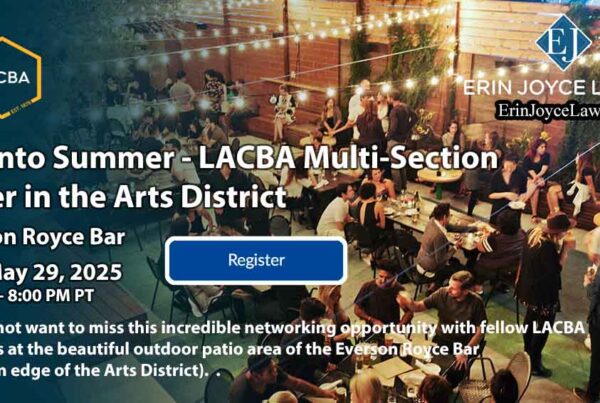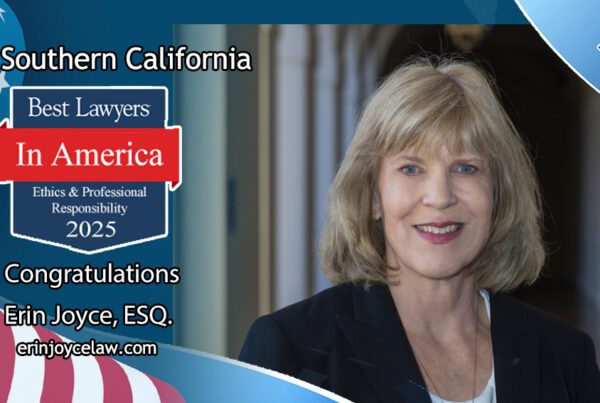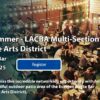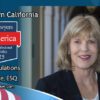State Bar Issues Draft Rules for Temporary Licensure Program
State Bar & Bar Associations
Sep. 3, 2020
Courtesy of Erin Joyce
A California provisionally licensed lawyer would be allowed to appear before a court, draft legal documents, contracts or transactional documents and pleadings, engage in negotiations and settlement discussions, and provide other legal advice, as long as a lawyer supervises the work.
Erin Joyce, chair of the small firm section at the Los Angeles County Bar Association, said the State Bar’s draft rules for a temporary licensure program for graduates who haven’t passed the bar suit California with its varied categories of law schools. (Courtesy of Erin Joyce Law).
The State Bar has begun circulating draft rules for a temporary supervised provisional licensure program which will be available for 2020 graduates who have not passed the bar exam. The deadline for the public to comment on the draft rules is Sept. 15.
Under the proposed rules, a supervising attorney would have more to say about what the provisionally licensed lawyer would be allowed to do than in other states.
To apply to the program, an applicant must pay $200, or $55 if the applicant will use the provisional license in an unpaid supervised volunteer capacity.
A California provisionally licensed lawyer would be allowed to appear before a court, draft legal documents, contracts or transactional documents and pleadings, engage in negotiations and settlement discussions, and provide other legal advice, as long as a lawyer supervises the work.
The supervising lawyer would have to work at the same firm as the provisional licensed lawyer. The supervisor must also have practiced law for at least four years in the U.S. and California for two years.
Saying they were impressed with the bar’s swift action in issuing the draft two months after being told by the state Supreme Court to set up the program, legal professionals noted some initial issues and opportunities with the proposed rules.
Calling it a humanitarian effort, Erin M. Joyce of Erin Joyce Law and chair of the small firm section at the Los Angeles County Bar Association, said the program is necessary to help graduates struggling to cope with the delays caused by the coronavirus pandemic.
“This is like building an airplane as we’re off the ground,” Joyce said. “This 100% a direct result of us not being able to administer a decent bar exam because of the pandemic.”
On July 16, the court directed the bar to create the program to help law school students facing challenges due to the pandemic to practice until June 1, 2022, without passing the bar exam. At the same time, the court lowered the bar exam passing score.
The court declined to implement a diploma privilege, such as in Wisconsin, that would grant graduates full admission, though many students and law school deans have called for it in California.
Instead, the bar looked at states such as New York, which have implemented a provisional licensure program.
“The diploma privilege is totally acceptable in Wisconsin because there are only two ABA-accredited law schools,” Joyce said. “It’s not one size fits all in California. We have ABA-accredited law schools. We have California-accredited law schools. We have completely unaccredited law schools.”
The bar also based the program in part on the bar’s multi-jurisdictional practice program, aimed at non-California attorneys seeking to practice in the state.
“Generally, I think it seems like a quite thoughtful, sensible proposal, and the State Bar deserves credit for setting this up quickly under difficult circumstances,” said Jason Solomon, executive director of the Center on the Legal Profession at Stanford Law School. “I’m concerned about the possibility that new graduates would work without pay, though I recognize there are pros and cons of allowing this.”
The bar could use the program to assess whether someone should be eligible to practice law or not, Solomon said. The supervising attorney could provide input to the bar on a possible applicant’s capabilities as an attorney, regardless of how they do on the bar exam. “Why not take advantage of all the information available?” Solomon said.
Mitchel L. Winick, dean at Monterey College of Law, said in an email that he is pleased with the proposed rules.
However, Winick said the bar should add a provision to the rules which would require the supervised lawyer to disclose to clients if he or she does not have professional liability insurance. The draft rules do not include such a provision.
After the comment period, the bar Board of Trustees must approve the final rules and send them to the court for confirmation.
LAW IN THE NEWS

Sip into Summer – LACBA Multi-Section Mixer


Top Professional Responsibility Lawyers 2025
CONTACT ERIN JOYCE LAW
REPRESENTING CLIENTS THROUGHOUT ALL OF CALIFORNIA
When you get a letter from the State Bar, don’t go it alone! You need competent, experienced counsel to respond to the State Bar at every stage. Your license is at risk, so ensure you have the best representation from a former State Bar prosecutor before sending any response to an investigator or responding to formal charges leveled by the State Bar. You cannot make an informed decision without good advice. Call Erin now.











